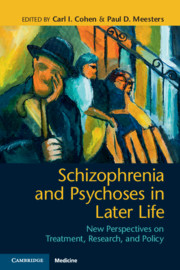Book contents
- Schizophrenia and Psychoses in Later Life
- Reviews
- Schizophrenia and Psychoses in Later Life
- Copyright page
- Contents
- Contributors
- Preface
- Acknowledgments
- Section 1 Epidemiology, Historical Background, Illness Phenomenology, and Diagnostic Issues
- Section 2 Biological, Neurocognitive, and Medical Aspects
- Section 3 Outcome and Course
- Section 4 Social Functioning and Mood
- Section 5 Treatment and Services
- Section 6 Health Policy and Research: Future Directions
- Index
- References
Section 3 - Outcome and Course
Published online by Cambridge University Press: 15 March 2019
- Schizophrenia and Psychoses in Later Life
- Reviews
- Schizophrenia and Psychoses in Later Life
- Copyright page
- Contents
- Contributors
- Preface
- Acknowledgments
- Section 1 Epidemiology, Historical Background, Illness Phenomenology, and Diagnostic Issues
- Section 2 Biological, Neurocognitive, and Medical Aspects
- Section 3 Outcome and Course
- Section 4 Social Functioning and Mood
- Section 5 Treatment and Services
- Section 6 Health Policy and Research: Future Directions
- Index
- References
- Type
- Chapter
- Information
- Schizophrenia and Psychoses in Later LifeNew Perspectives on Treatment, Research, and Policy, pp. 95 - 116Publisher: Cambridge University PressPrint publication year: 2019



